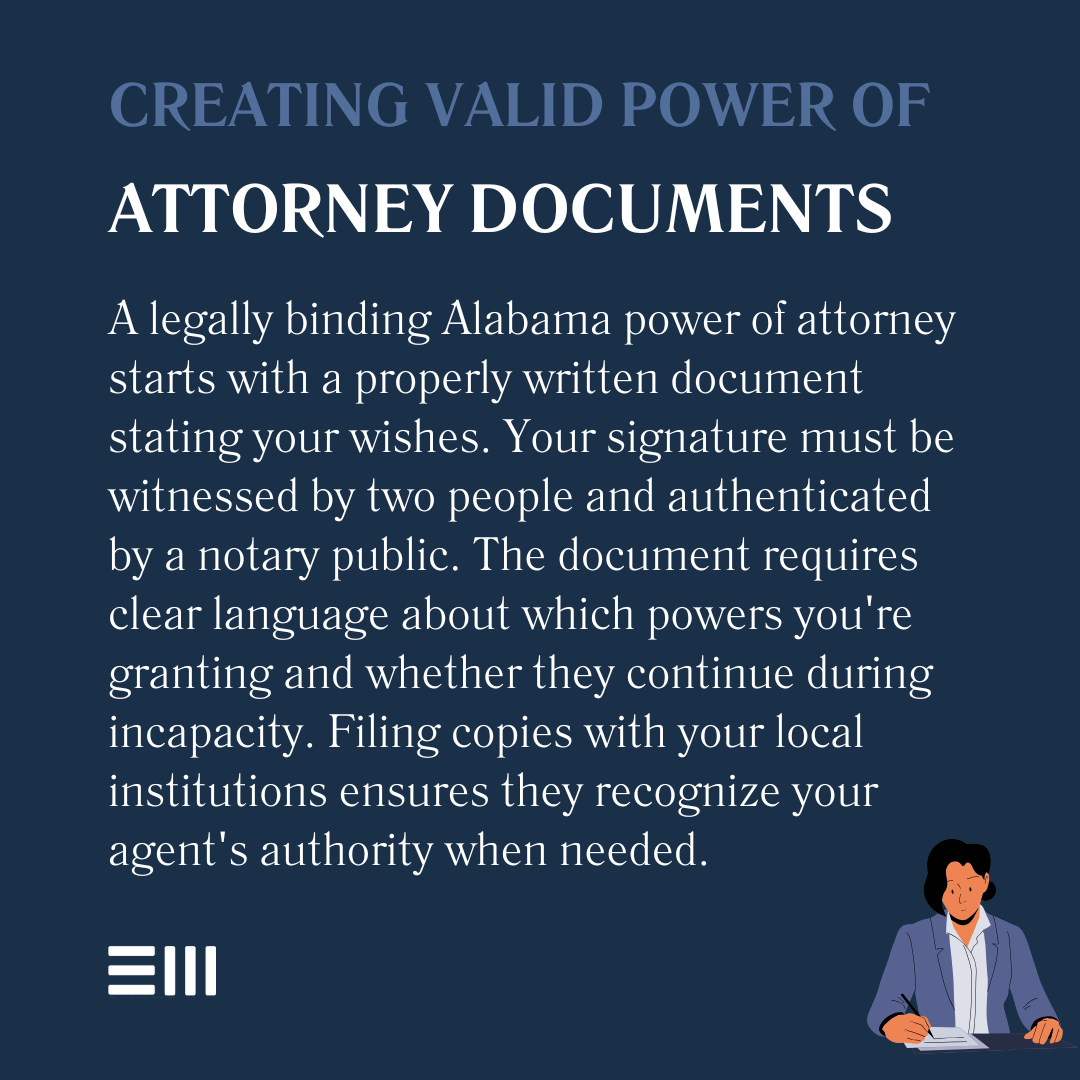In emergency rooms, banks, and courthouses across Alabama, families face closed doors when trying to help their loved ones.
A stroke leaves adult children unable to access medical records. Military deployment prevents a spouse from refinancing their home.
Memory loss blocks parents from helping their aging children manage finances. These barriers between family members arise from a single missing document: power of attorney.
While Alabama law protects individual rights through strict privacy requirements, it also provides a clear path forward through properly executed power of attorney documents.
Step-by-Step Process to Grant Power of Attorney
Creating a power of attorney in Alabama involves specific legal steps that ensure your document stands up to scrutiny when needed.
Understanding each component helps you navigate the process with confidence and avoid common pitfalls that could invalidate your document.
The process requires attention to detail and careful consideration of your unique circumstances.
Choosing Your Agent
Selecting the right person to act as your agent marks your first and most important decision in the power of attorney process.
This individual will have significant responsibilities in managing your affairs and must possess specific qualities to serve effectively.
- Character and trustworthiness assessment;
- Financial management capabilities;
- Geographic proximity for practical matters;
- Willingness to serve in this role;
- Understanding of your wishes and values;
- Ability to make difficult decisions;
- Time availability for duties;
- Relationship with family members;
- Professional expertise if relevant;
- Communication skills;
- Problem-solving abilities; and
- Emotional stability.
Your agent's reliability and competence directly impact the effectiveness of your power of attorney arrangement. Take time to discuss the role with potential agents and ensure they understand their responsibilities.
Required Legal Elements
Alabama law establishes specific requirements for power of attorney documents to be considered valid and enforceable.
Meeting these criteria ensures your document will be accepted by banks, healthcare providers, and other institutions across the state.
- Written document following state guidelines;
- Clear identification of principal and agent;
- Specific powers granted and enumerated;
- Notarized signature with proper seal;
- Two witness signatures meeting legal criteria;
- Mental competency at signing verified;
- Explicit durability statement if desired;
- Original document preservation methods;
- Copies for relevant parties and institutions;
- Proper execution date and location;
- Clear specification of effective date; and
- Compliance with Alabama Code requirements.
Careful attention to these requirements prevents future challenges to your document's validity and ensures smooth implementation when needed.
Types of Powers You Can Grant
Understanding the scope of authority you can delegate helps you create a more effective power of attorney.
Alabama law allows for various levels of authority depending on your needs.
- Financial account management;
- Real estate transactions;
- Business operations;
- Healthcare decisions;
- Tax matters;
- Insurance claims;
- Government benefits;
- Retirement accounts;
- Digital asset access;
- Personal property management;
- Contract negotiation;
- Debt management;
- Investment decisions;
- Estate planning coordination; and
- Legal proceedings.
Each type of power should be carefully considered and explicitly stated in your document.
Optional Provisions to Consider
Beyond the basic requirements, you can customize your power of attorney to better serve your specific needs. These additional provisions help clarify your intentions and provide guidance to your agent.
- Successor agent designation process;
- Compensation arrangements and terms;
- Record-keeping requirements and frequency;
- Consultation requirements with family;
- Gift-giving authority and limits;
- Real estate transaction parameters;
- Digital asset management protocol;
- Healthcare preferences specification;
- Living arrangements guidelines;
- Pet care instructions and funding;
- Family business provisions;
- Travel authorization;
- Property distribution guidelines;
- Communication requirements; and
- Dispute resolution procedures.
These optional elements strengthen your document and provide clear direction for your agent's actions.
Understanding Agent Responsibilities
When granting power of attorney, it's crucial to understand the duties and obligations your agent must fulfill.
This knowledge helps both you and your agent prepare for the role.
- Fiduciary duty maintenance;
- Accurate record keeping;
- Regular communication requirements;
- Decision documentation;
- Asset protection measures;
- Conflict of interest avoidance;
- Delegation restrictions;
- Investment management standards;
- Healthcare coordination;
- Family relationship management;
- Professional service coordination; and
- Emergency response protocols.
A clear understanding of these responsibilities helps ensure the proper execution of the agent's duties.
Common Mistakes to Avoid
When creating a power of attorney, certain oversights can weaken or invalidate your document. Understanding these potential pitfalls helps ensure your power of attorney serves its intended purpose effectively.
- Using generic forms without state-specific provisions;
- Failing to update outdated documents;
- Choosing an unreliable agent without vetting;
- Granting overly broad powers without limits;
- Neglecting to specify durability intentions;
- Missing required signatures or witnesses;
- Improper witness selection criteria;
- Delayed document distribution to parties;
- Inadequate power specifications;
- Poor record-keeping systems;
- Failing to notify financial institutions;
- Overlooking digital asset provisions;
- Ignoring successor agent designation;
- Insufficient security measures; and
- Unclear activation conditions.
Learning from these common errors helps you create a more effective power of attorney that serves its intended purpose.
The Role of Professional Assistance
While do-it-yourself options exist, professional legal guidance offers significant advantages in creating a power of attorney.
Legal professionals provide valuable insights and safeguards throughout the process.
- Document drafting expertise and customization;
- State law compliance verification;
- Witnessing coordination and authentication;
- Filing assistance with institutions;
- Future modification support;
- Family communication guidance;
- Institution coordination services;
- Dispute prevention strategies;
- Asset protection planning;
- Tax implication analysis;
- Healthcare directive integration;
- Estate plan coordination;
- Digital asset planning;
- Business succession integration; and
- Regular review schedules.
Professional support helps ensure your power of attorney meets all legal requirements and serves your intended purpose effectively.
Maintaining and Updating Your Power of Attorney
Creating your power of attorney isn't the end of the process.
Regular maintenance ensures your document remains effective and relevant to your changing circumstances.
- Annual document review;
- Life change assessments;
- Agent capability verification;
- Institution notification updates;
- Copy distribution management;
- Digital storage security;
- Witness contact updates;
- Professional advisor coordination;
- Family communication maintenance; and
- Healthcare provider updates.
Regular maintenance helps ensure your power of attorney remains effective when needed.
Frequently Asked Questions About Granting Power of Attorney in Alabama
Understanding the process of granting power of attorney raises many questions.
Here are answers to common concerns about creating these important documents in Alabama.
What Powers Can I Grant Through a Power of Attorney?
You can grant broad or limited powers, including authority over financial matters, real estate transactions, healthcare decisions, and business operations. The scope of authority should align with your specific needs and comfort level.
How Long Does a Power of Attorney Last?
A power of attorney remains valid until you revoke it, pass away, or become incapacitated (unless it's durable). You can also specify time limits or conditions that trigger expiration.
Can I Still Make Decisions After Granting Power of Attorney?
Yes, granting power of attorney doesn't restrict your own authority. You maintain full control over your affairs as long as you're mentally competent.
How Do I Revoke a Power of Attorney?
You can revoke your power of attorney by creating a written revocation document, notifying your agent, and informing any institutions that received the original document.
What Happens if My Agent Misuses Their Authority?
Agents who misuse their authority can be held legally and financially responsible for their actions. You can also revoke their authority and pursue legal remedies for damages.
Can I Have Multiple Agents in My Power of Attorney?
Yes, you can appoint multiple agents to act either jointly or independently. However, clear guidelines for decision-making authority help prevent conflicts.
What Makes a Power of Attorney Durable in Alabama?
A power of attorney becomes durable when it explicitly states that the authority continues if you become incapacitated. This provision must be clearly stated in the document.
Expert Guidance for Your Peace of Mind
Take control of your future with professional assistance in creating your power of attorney.
Our experienced attorneys understand Alabama's requirements and can help you establish a document that protects your interests.
Contact us today for a confidential consultation about your power of attorney needs.


